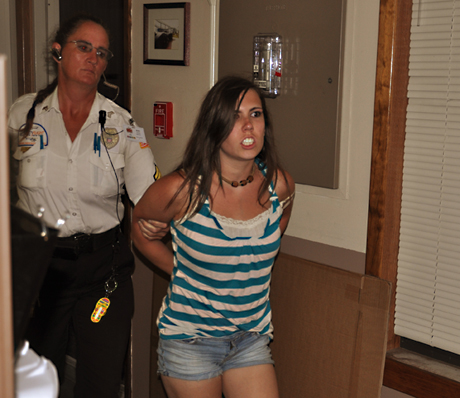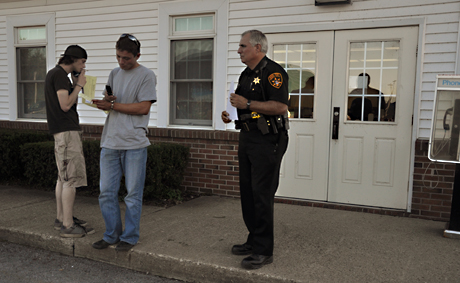
As a man we only knew as John Doe lay cuffed and prostrate in the back of a patrol car waiting to be arraigned on a trespass charge at Darien Town Court, Chief Deputy Gordon Dibble mused, "some people just shouldn't drink."
The night was still young, but already a handful of individuals had caused a mess of trouble for security and law enforcement at Darien Lake Performing Arts Center during the Aug. 28 Tom Petty concert.
Outside of two young guys busted for allegedly trying to sell hallucinogenic mushrooms, all of the night's law enforcement issues dealt with people drinking, and a little marijuana use, too.
"There are many more arrests we could make, but we try to arrest the people who need to be arrested," Dibble said. "We try to eject as many people as we can -- the people who can’t behave themselves. Usually the people who get arrested -- there’s just no other alternative."
 Take the case of Jonathan Raymond -- a.k.a. John Doe: When he was taken into custody, according to one deputy, even his friends were saying, "Get him out of here."
Take the case of Jonathan Raymond -- a.k.a. John Doe: When he was taken into custody, according to one deputy, even his friends were saying, "Get him out of here."
Investigator Roger Stone, who was in uniform, was on patrol and served as my ride-along escort for the first part of the night. We encountered Raymond in the security trailer next to the concert venue where arrestees are first brought for processing.
At about 5'-10" and 190 lbs, the 21-year-old Raymond had some strength to throw around if he wanted. He offered enough resistance and spit out enough verbal threats that deputies were clearly intent on keeping him under control.
In the trailer, two deputies kept Raymond cuffed in a chair and their arms on his shoulders.
He kept demanding to leave, cussed at anybody who came within sight and let everybody know that given a chance, he could and or would kill them.
As Raymond sat while Sgt. Thomas Sanfratello prepared his paperwork, a female security guard pushed into the trailer a cuffed 19-year-old Sara J. Cooper.
"Whoa, I'm so scared," Cooper yelled. "Just so you know."
Later Cooper would reportedly start calling a woman deputy a couple of choice female-specific slurs and allegedly fight back against a deputy, getting herself shoved against a wall and held there until she settled down.
When it came time to escort Raymond to Stone's cruiser, five deputies were on hand to lead him from the trailer to the car and then try to get him into the back seat.
Raymond said he wasn't going to do it. He wanted to be let go.
Investigator Stone, whose smooth baritone could improve many doctors' bedside manner, said, “You seem like a good guy. Why don’t you just get in?”
“Who are you?
“Stone.”
“Stone who?”
“Roger Stone. I’m one of the deputies.”
Raymond didn't move. One of the deputies suggested picking up by turning him on his side and pushing him log-like into the backseat.
While Raymond verbally protested, his bit of wiggling and bucking was easily controlled by the deputies.
Once we were on the road, Raymond told Stone, "You're pro-Indian, so why do you act like a white man, mother f---ker?"
When Stone didn't answer, Raymond pleaded, "Stonehorse?" No reply. Louder: "Stonehorse?"
"What?" Stone kind of whined.
“If you act like a white man, you are a white man.”
Raymond then started to cry.
“I want you to be on our side, Stonehorse.”
Pause.
“I’m going to kill you Stonehorse.
Stone: "No you’re not. Come on."
"Ok," Raymond said. "I won’t."
And a few minutes later, Raymond said again, "I'm going to kill you, Stonehorse."
I asked Stone, "Isn't that something you could charge him with?"
Stone shrugged. "Sure," he said, "But why?"
Roger Stone is clearly not a cop who relishes confrontation. When he drove Brett Tofil and Joseph Kulig to the Genesee County Jail following their arrests on drug charges, each getting $5,000 bail, one of the young men thanked Stone for "being cool."
But that "coolness" doesn't deter Stone from understanding he has a job to do. He sees a lot of value in the drinking-related arrests the Sheriff's Office makes, and also in the underage drinking citations deputies issue.
He totally rejects the suggestion that these law enforcement efforts are just aimed at generating revenue for the county or are motivated by a cop's desire to ruin somebody's good time.
"We’ll never know when we’ve stopped somebody from getting too inebriated," Stone said. "We’ll never know when we’ve saved their lives or the lives of somebody else. To me, that’s the reason why we need to do it.
"It’s the same thing as getting drunken drivers off the road. We’re never going to know whether we stopped some accident or somebody from being injured or killed. But you know the fact that we’re going out there and reducing it now and then is a good thing, and I feel good about doing it."
The Sheriff's Office has only 25 patrol officers, including sergeants, according to Dibble, so when it comes to one of the 18 concert nights at Darien Lake, Dibble himself and investigators such as Stone help out with patrols.
The Sheriff's Office provides traffic control and law enforcement inside the venue, while the State Police also patrol the roads surrounding the venue, mainly targeting drunken drivers.
To help with the manpower inside the concert venue, this summer, Sheriff Gary Maha deputized off-duty Batavia police officers, who were paid by the concert promoter, Live Nation.
During the Petty concert, one of those deputized officers, Eric Hill, was hurt when 20-year-old Matthew J. Pasternak allegedly resisted arrest. Hill's finger was splinted and iced following the altercation and Hill was concerned that it was broken. A couple of days later, Hill said his finger was still sore, but didn't appear to have been broken. He didn't miss any duty.
The Petty concert on Aug. 26, as well as the one a couple of weeks earlier, had a number of violent confrontations with law enforcement. Deputies found it surprising, since Petty is an older act without much of a hard-rock edge, and they said Petty concerts weren't, in past years, rowdy.
But every performer brings it owns audience, Dibble said.
"Some are more aggressive," Dibble said. "Some bring in more drugs, some more alcohol and some bring in more kids sometimes."
Dibble said the Sheriff's Office works closely with Live Nation so deputies are prepared to deal with the type and size of crowd anticipated.
"It's a partnership for sure," Dibble said.
Live Nation actually pays for all of the law enforcement inside the concert venue, including about 100 of its own security personnel (including personnel in the parking lots), according to Pete Riedy, with Live Nation.
People pay a lot of money to attend shows at Darien Lake, and 99 percent of them have a good time, and even down a few beers, without causing a problem, Riedy said. They don't want to be bothered with unruly drunks.
"Unfortunately there’s always a few people who take it to the next limit and cause problems," Riedy said. "Alcohol is usually the reason. ... No matter how many rules and restrictions you put on people, there are going to be certain people who can’t control themselves."
And with booze being the chief cause of problems, Riedy said, it's important that both security and local law enforcement address the underage drinking issue. While some people criticize deputies for writing underage drinking citations, Riedy said it's an important part of keeping people safe.
"Nothing good comes out of kids drinking in the parking lot and drinking when they're under age," Riedy said. "If I could, I’d have 100 more Sheriff’s deputies out there."
And writing underage drinking citations isn't hard, Dibble said. The typical kid will walk right up to a deputy, or otherwise brazenly display a beer or wine bottle with law enforcement in the area.
Dibble recalled one time he was standing in the parking lot -- in uniform -- and a 17-year-old walked right up to him, beer in hand.
"I don’t know if it’s the effects of alcohol, if it’s a sense of entitlement, I don’t know," Dibble said. "I can’t explain that."
If not for the deputies enforcing the underage drinking law, Riedy said, the only other alternative would be to disallow tailgating, and Live Nation doesn't want to do that. It wouldn't be fair to the majority of people who can remain civil and obey the rules.
"(Drinking problems) don't make our venue look good," Riedy said. "It doesn't make any venue look good. It makes people not want to come back. My biggest concern running the venue is people’s safety and people enjoying the concert.
"People pay a lot of money to come here. My biggest concern is that people have a good time."

Photos: Top, Sara Cooper is escorted into the processing trailer; Inset, Jonathan Raymond being held in his chair inside the trailer; Bottom, Brett Tofil and Joseph Kuligafter outside Darien Court after being arraigned. Roger Stone, right, allowed them a chance for a smoke and to make calls on their personal mobile phones to friends and relatives to arrange for bail.


 Take the case of Jonathan Raymond -- a.k.a. John Doe: When he was taken into custody, according to one deputy, even his friends were saying, "Get him out of here."
Take the case of Jonathan Raymond -- a.k.a. John Doe: When he was taken into custody, according to one deputy, even his friends were saying, "Get him out of here." 